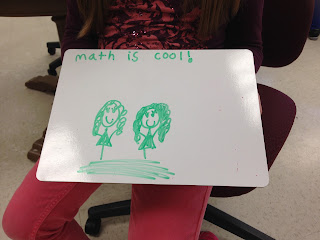Typically my students walk in to my classroom feeling discouraged and frustrated with math. Many of them even tell me that they hate math. The first year, this really intimidated me. Now, it fuels me. I have made it my personal goal to help students find their love of math. Here are a few tips that make a huge impact on their feelings about math.
1. Be Excited: Now I realize that not all teachers love math the way I do. For you, I recommend you spend a little extra time immersing yourself in math. Don't go crazy. Chose one or two skills a semester to focus on. Ask math specialists, Title I teachers, or your friends who enjoy math, what they do while teaching that skill that works and engages students. This will take away some of the fear for you and you'll be more likely to take a few risks. For those of you who already have a love of math, are you still teaching math the way your teachers did? If you love math, sing it to the mountain tops! Tell everyone you meet! Teach like you love it. Do you see teachers who love teaching science reading out of a textbook everyday? No! They are leading experiments. They are encouraging students to not only ask quality questions, but to answer them themselves. Students work together in groups, try things out, and discuss what did and did not work. Their passion shows in their teaching. Honestly reflect on your math teaching. Does your passion show? How can you grow?
 2. Be Real: I know you've heard it before; Including real world content into lessons engage students. Well....there is a good reason you keep hearing that. It's true! I pride myself on having a real world connection to every skill I teach my students. Box and whisker plot graphing nearly broke me, but I figured it out through my love of baseball. This is not only good for student engagement, but it is also really fantastic way to support problem solving in a less intimidating way. Asking a student to divide 1 1/2 by 7 is not the most exciting thing to do. However, if you ask them to divide 1 1/2 bags of candy among 7 people, things just got real. Kick that up a notch by giving a group of 7 people a bag and a half of candy to divide and you are going to impact their entire view of fractions! (And probably yours) Start the day with a math challenge related to something you heard on the radio or saw on tv. Pose problems about the sports playoffs going on at the time, the price of the hottest concert tickets, or amount of memory on the coolest tech gadget. Questions do not have to be anything formal or complicated. Just ask how much you would have to save each week, what the chances are of a certain team winning, or how many days are left until a big event. Simple yet highly impactful. Very little teacher prep that leads to tons of opportunity to spiral skills and improve academic math vocabulary.
2. Be Real: I know you've heard it before; Including real world content into lessons engage students. Well....there is a good reason you keep hearing that. It's true! I pride myself on having a real world connection to every skill I teach my students. Box and whisker plot graphing nearly broke me, but I figured it out through my love of baseball. This is not only good for student engagement, but it is also really fantastic way to support problem solving in a less intimidating way. Asking a student to divide 1 1/2 by 7 is not the most exciting thing to do. However, if you ask them to divide 1 1/2 bags of candy among 7 people, things just got real. Kick that up a notch by giving a group of 7 people a bag and a half of candy to divide and you are going to impact their entire view of fractions! (And probably yours) Start the day with a math challenge related to something you heard on the radio or saw on tv. Pose problems about the sports playoffs going on at the time, the price of the hottest concert tickets, or amount of memory on the coolest tech gadget. Questions do not have to be anything formal or complicated. Just ask how much you would have to save each week, what the chances are of a certain team winning, or how many days are left until a big event. Simple yet highly impactful. Very little teacher prep that leads to tons of opportunity to spiral skills and improve academic math vocabulary.3. Be Compassionate: Stop for a moment and remember a time when one of your classmates (co-workers, teacher, boss....) was very vocal about how EASY they felt the lesson was. Can you hear their tone of voice? Can you feel your skin crawl? Can you feel any confidence you had left disappear? That is exactly how our students feel when they hear others announce that the skill that they do not understand is coming easily to others. On a side note, too often those announcing how easy it is actually have no idea what they are talking about either, but that is a whole other post. It is vital when creating a supportive math community that all students, gifted, strugglers, and everyone between, feel like what they have to say is important and valued by everyone. Most of the students and teachers who walk into my life hating math simply need to build their confidence. Choose your words carefully and do not allow students to feel bullied or demeaned in any way. Celebrate mistakes as an opportunity to learn, embrace students' questions because they trust you enough to ask, and encourage students to explain the mathematical choices.
 I believe that we all have the potential to grow as mathematicians. We are only limited by the belief we have in ourselves and that others have in us.
I believe that we all have the potential to grow as mathematicians. We are only limited by the belief we have in ourselves and that others have in us. 












No comments